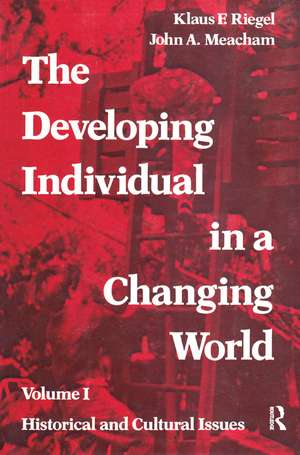The Developing Individual in a Changing World: Volume 1, Historical and Cultural Issues
Autor John A. Meachamen Limba Engleză Hardback – 14 aug 2018
Volume I, Historical and Cultural Issues, examines the problems of behavioral development from historical, political, theoretical, and cultural points of view. A number of content areas already familiar to developmental psychologists are discussed: Piaget's theory, perceptual development, socialization, and language acquisition. In addition, topics relatively unfamiliar to American psychologists are included: the contribution of early European developmentalists such as William and Clara Stern, Alfred Binet, and Eduard Spranger; and an introduction to recent Soviet developmental theory.
Volume II, Social and Environmental Issues, considers the effects of changes in social and environmental conditions upon individual development. The expanding impact of technology such as the communications media, the importance of nutrition, and the design of playgrounds and other spaces for growing children are among the changes examined, as are the impact of social organizations and interactions within small groups, focusing upon preschool education, interaction within the family, and personality development throughout the individual's life.
| Toate formatele și edițiile | Preț | Express |
|---|---|---|
| Paperback (2) | 292.51 lei 6-8 săpt. | |
| Taylor & Francis – 15 dec 2007 | 292.51 lei 6-8 săpt. | |
| Taylor & Francis – 15 dec 2007 | 438.05 lei 6-8 săpt. | |
| Hardback (2) | 669.94 lei 6-8 săpt. | |
| Taylor & Francis – 14 aug 2018 | 669.94 lei 6-8 săpt. | |
| Taylor & Francis – 13 iul 2017 | 1000.27 lei 6-8 săpt. |
Preț: 669.94 lei
Preț vechi: 788.16 lei
-15% Nou
Puncte Express: 1005
Preț estimativ în valută:
128.23€ • 139.34$ • 107.79£
128.23€ • 139.34$ • 107.79£
Carte tipărită la comandă
Livrare economică 21 aprilie-05 mai
Preluare comenzi: 021 569.72.76
Specificații
ISBN-13: 9781138535091
ISBN-10: 1138535095
Pagini: 472
Dimensiuni: 152 x 229 mm
Greutate: 0.45 kg
Ediția:1
Editura: Taylor & Francis
Colecția Routledge
Locul publicării:Oxford, United Kingdom
ISBN-10: 1138535095
Pagini: 472
Dimensiuni: 152 x 229 mm
Greutate: 0.45 kg
Ediția:1
Editura: Taylor & Francis
Colecția Routledge
Locul publicării:Oxford, United Kingdom
Cuprins
I: Historical and theoretical issues in the development of the individual and society; 1: Early European contributions to developmental psychology; A: Overview, Contexts, and Selections; B: The Contribution of William and Clara Stern to the Onset of Developmental Psychology 1; C: The Real World of Alfred Binet; D: Development and Value Orientation: The Contribution of Eduard Spranger to a Differential Developmental Psychology; 2: The development of women through history; A: Astarte Moses and Mary: Perspectives on the Sexual Dialectic in Canaanite, Judaic, and Christian Traditions; B: B. Two Types of Women Writers and Three Periods in Time: A Psychohistorical Analysis; C: Planned Obsolescence: Historical Perspectives on Aging Women; 3: Formal models of development; A: Organization and Transformation; B: Conceptualizing Behavioral Development; C: C. A View of Cognition from A Formalist’s Perspective; D: D. Some Ingredients for Constructing Developmental Models; II: Cognitivists’ and socialists’ inquiries into human development; 1: The concept of development and the genetic approach in psychological theory of the Soviet Union and other socialist countries; A: Philosophy and Psychology in the Soviet Union; B: B. The Soviet Concept of Development and the Problem of Activity; C: Conditions and Determinants of Child Development in Contemporary Polish Psychology; 2: Soviet developmental study of verbal self-regulation; A: Recent Developments in Soviet Research on the Verbal Control of Voluntary Motor Behaviour; B: Speech-For-Self as a Multiply Reafferent Human Action System; C: C. Developmental Aspects of Rhythm in Selfregulation; D: The Function of Speech Rhythms in the Regulation of Non-Speech Activity; E: Soviet Research in the Psychophysiology of Individual Differences; F: Life-Span Cognitive Development and the Soviet Theory of Self-Regulation; 3: Cognitive development through life: Research based on Piaget’s system; A: Sensorimotor Period: The Source of Intellectual Development; B: The Role of Structures in Explaining Behavioral Development.; C: Life-Span Analyses of Piagetian Concept Tasks: The Search for Nontrivial Qualitative Change; 4: Theoretical viewpoints in perceptual development: The illusion as paradigm; A: Illusions and Perceptual Development: A Tachis-Toscopic Psychophysical Approach; B: Perceptual Development: A Distorted View; C: Cross-Cultural and Personality Factors Influencing the Ponzo Perspective Illusion; III: Cross-cultural differences in human development; 1: The individual in developmental theory: Cross-cultural perspectives; A: A Conceptual Model for Study of Individual Development in Different Cultures; B: Erikson’s Theory in Cross-Cultural Perspective: Social Class and Ethnicity in Third World’ Communities; C: Thematic Structuration in Adolescence: Findings from Different European Countries; D: Thematic Structuration in Adolescence: Findings From Pedi Adolescents; 2: Problems of cross-cultural research; A: The Problem of the Packaged Variable; B: Situating the Experiment in Cross-Cultural Research; C: Cross-Cultural Research and Piagetian Theory: Paradox and Progress; D: Cross-Cultural Piagetian Studies: What Can they Tell Us?; 3: Cultural differences in socialization techniques; A: Maternal Socialization Practices and Spatial-Perceptual Abilities in Newfoundland and Labrador; B: A Test of the Universality of an ‘Acculturation Gradient’ in Three Culture-Triads; C: A Cross-Cultural View of Adult Life in the Extended Family; 4: Subcultural differences in language aquisition; A: Some Theoretical Considerations of Subcultural Differences in Language Development; B: An Information Processing Approach to Some Problems in Developmental Sociolinguistics; C: Some Psycholinguistic and Social Predictors of Dialect Usage Among Subjects and Their Most Preferred Peers
Descriere
This two-volume work levels both criticism and challenge to traditional developmental psychology












